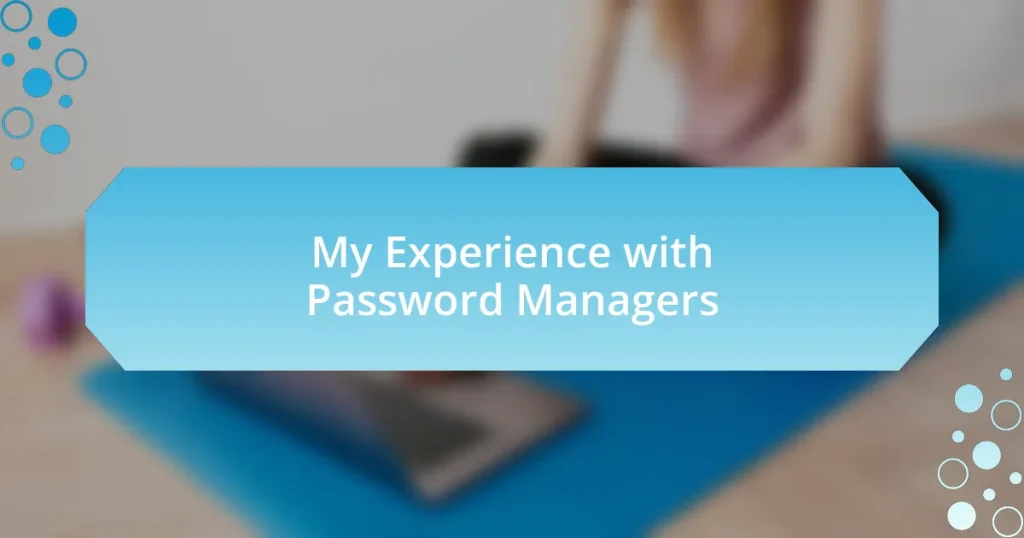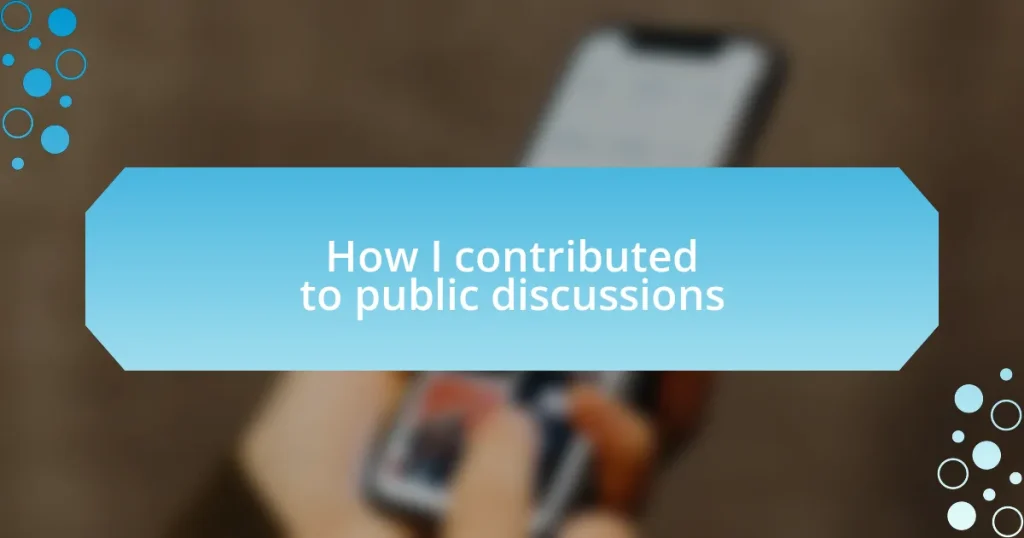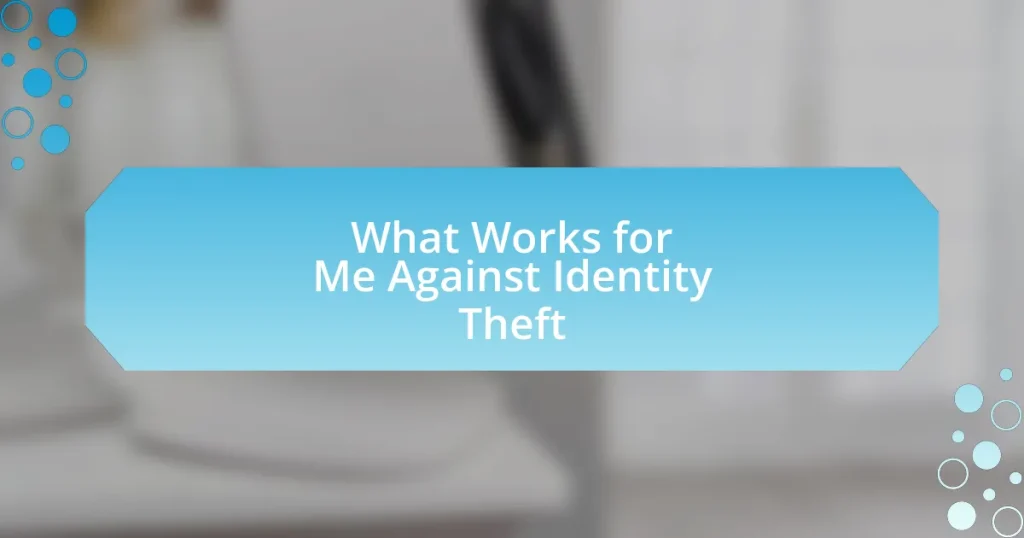Key takeaways:
- Password managers securely store and generate strong passwords, enhancing online security and relieving the stress of password management.
- Strong, unique passwords for each account are vital as they reduce the risk of breaches and make hacking more difficult.
- Choosing the right password manager involves evaluating features, pricing, and the level of security offered.
- Regular maintenance, including audits of saved passwords and updates to the password manager, is essential for effective ongoing security.
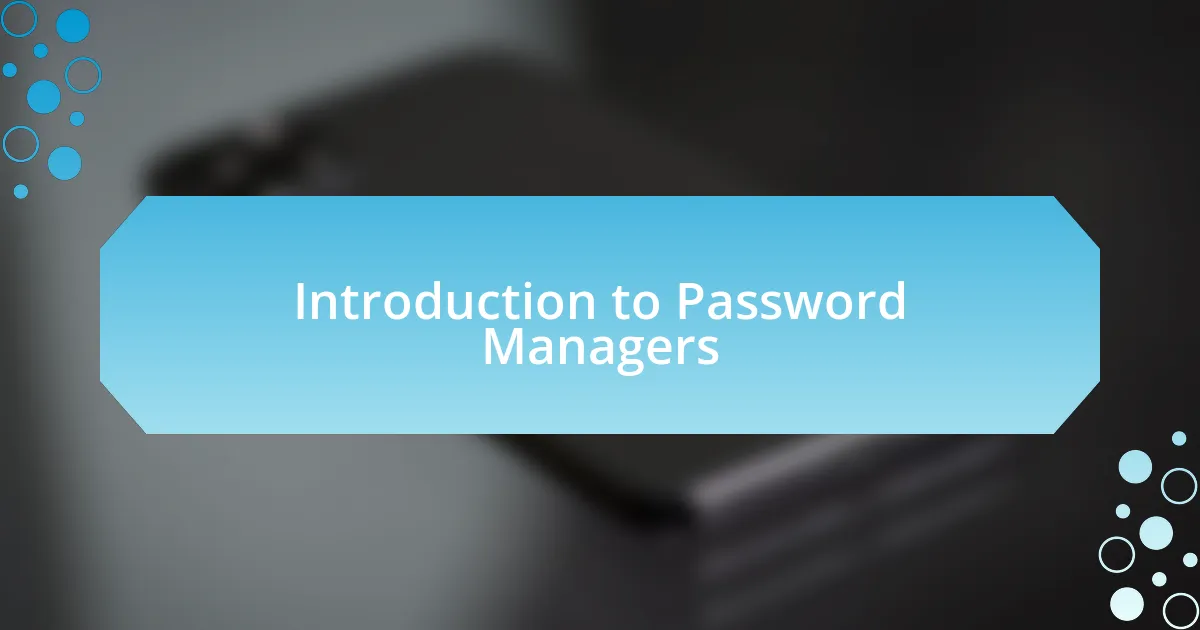
Introduction to Password Managers
In today’s digital landscape, remembering multiple complex passwords can feel like juggling flaming torches. I remember the moment I realized I had forgotten my email password for the third time in a month; the frustration was palpable. This is where password managers truly come into play, offering a solution that not only keeps your passwords secure but also prevents those all-too-frequent moments of panic.
Password managers function like a digital vault, storing all your login credentials in one secure place. The first time I used one, it felt like a weight had been lifted from my shoulders—I could finally enjoy the convenience of quick logins without the mental strain of remembering every detail. Doesn’t it sound appealing to access your accounts without the fear of getting locked out or having to reset a password every other week?
These tools not only simplify the password management process but also enhance your online security. I’ve seen firsthand how their ability to generate strong passwords can protect against potential breaches. It makes me wonder: why struggle with weak passwords when a password manager can help create and store them safely?
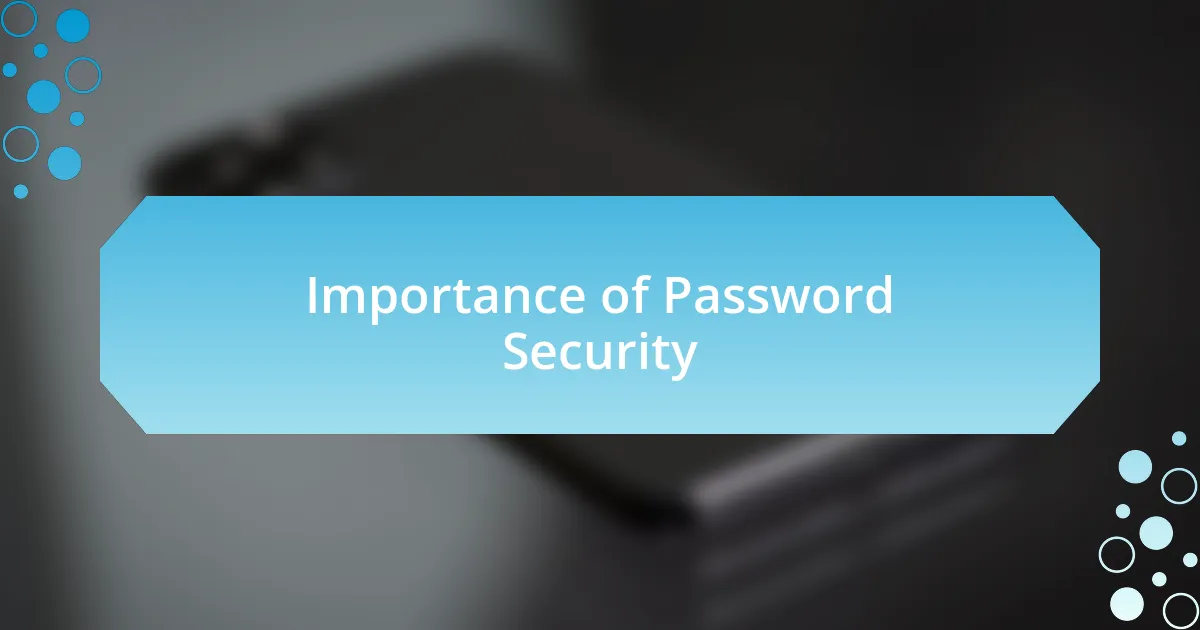
Importance of Password Security
When it comes to online security, the importance of strong passwords cannot be overstated. I vividly remember a colleague who experienced a major data breach simply because their password was too predictable. It reminded me how easily hackers can exploit weak passwords and gain access to sensitive information, costing individuals and businesses time, money, and trust.
To ensure your online accounts remain secure, consider these vital points:
– Weak passwords are easy targets for hackers, who often use automated tools to crack them.
– Unique passwords for each account can prevent a single breach from exposing multiple accounts.
– Utilizing a mix of letters, numbers, and symbols in passwords dramatically increases their strength.
– Regularly updating passwords helps guard against unauthorized access and keeps your data safe.
– Password managers not only store strong passwords but also remind you when to change them, mitigating risk effectively.
Engaging with the reality of password security can often feel daunting, but I’ve found that having a proactive approach—especially with a password manager—transforms it into a manageable task. Knowing my digital life is secure allows me to focus on what really matters, like enjoying my time online without the constant worry of potential breaches lingering over my head.
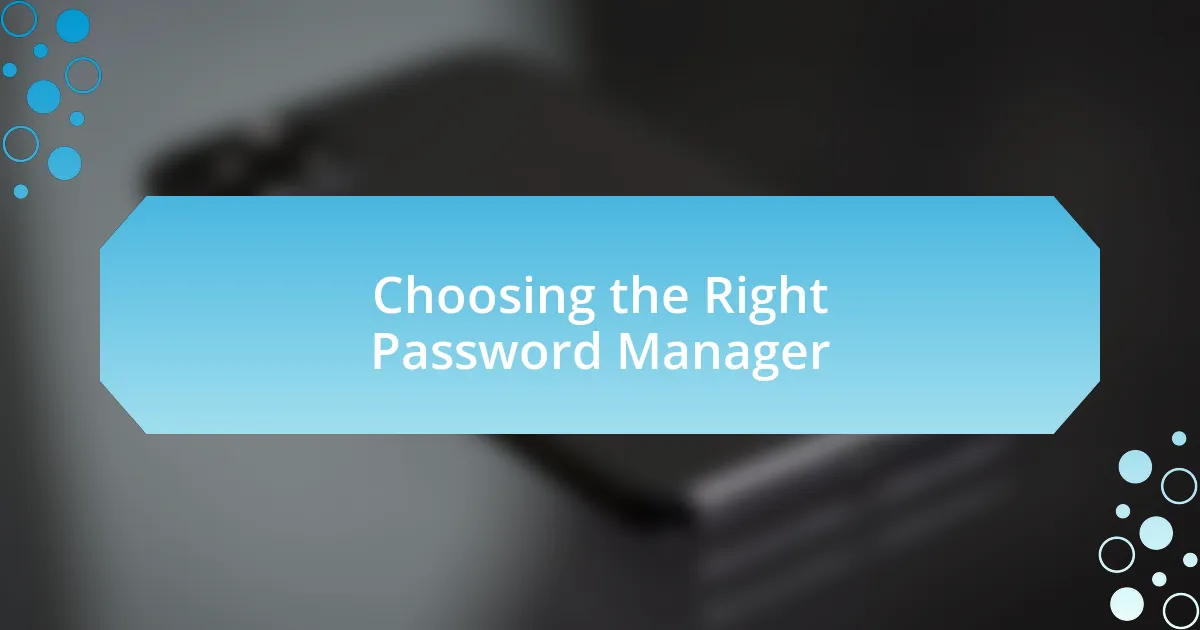
Choosing the Right Password Manager
Choosing a password manager is a crucial step in enhancing your online security. I recall feeling overwhelmed with options when I first started looking for a password manager. Each had unique features, but I quickly learned that not all are created equal. It’s essential to consider what you need most—be it ease of use, active security features, or multi-device syncing.
Another key consideration is whether you prefer a free version or a paid subscription. For instance, using a free password manager can be tempting, but I’ve personally experienced limitations with free options. They often lack advanced functions like dark web monitoring or secure file storage, which have become instrumental in my online safety.
Ultimately, the decision boils down to what makes you feel secure. I’ve found that investing in a reliable password manager gives me peace of mind, allowing me to concentrate on my work and personal interests without the constant fear of a cyberattack. Take the time to read reviews, like I did, and see what features resonate most with your lifestyle to find the perfect fit.
| Password Manager | Key Features |
|---|---|
| LastPass | User-friendly interface, free version available, strong security features |
| 1Password | Excellent security features, family sharing, no free version |
| Bitwarden | Open-source, free tier available, highly customizable |
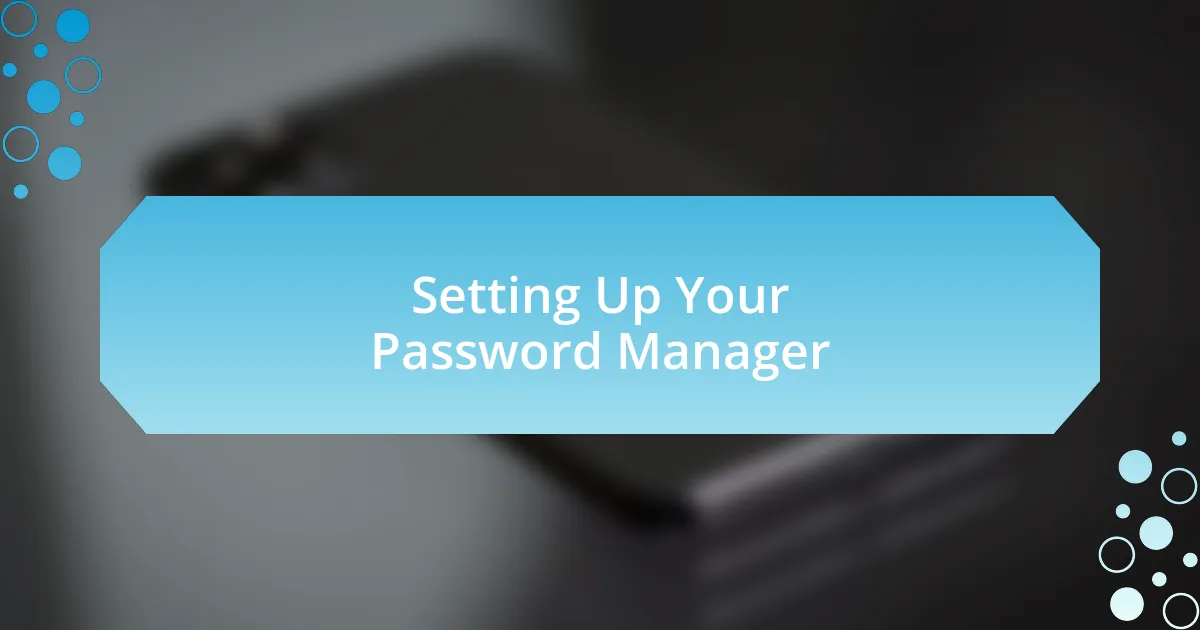
Setting Up Your Password Manager
Setting up your password manager is more straightforward than I initially thought. I remember the first time I installed one; it felt like a little victory. You typically start by creating a master password, which is crucial—this password grants you access to all your other credentials. I’ve learned that choosing something both memorable and complex is key; I often ponder whether my master password is secure enough and take extra care in creating it.
Once your master password is set, importing your existing passwords can save significant time. I was amazed when I discovered the import option—it gathered all my saved passwords from various browsers in mere minutes. This feature alone made the setup feel like a huge win, as I didn’t have to dig through countless old accounts. But it’s essential to double-check for accuracy; I’ve found that occasionally, some entries might need manual adjustments.
After everything is in place, customizing settings to fit your needs is a game changer. I remember tweaking the security options to enable two-factor authentication (commonly referred to as 2FA), which added an extra layer of protection. Have I felt more secure since making this adjustment? Absolutely. The peace of mind that comes with knowing my sensitive information is locked down has changed how I approach my online activities—I can navigate the digital world with confidence, knowing I have taken the right steps toward safeguarding my data.
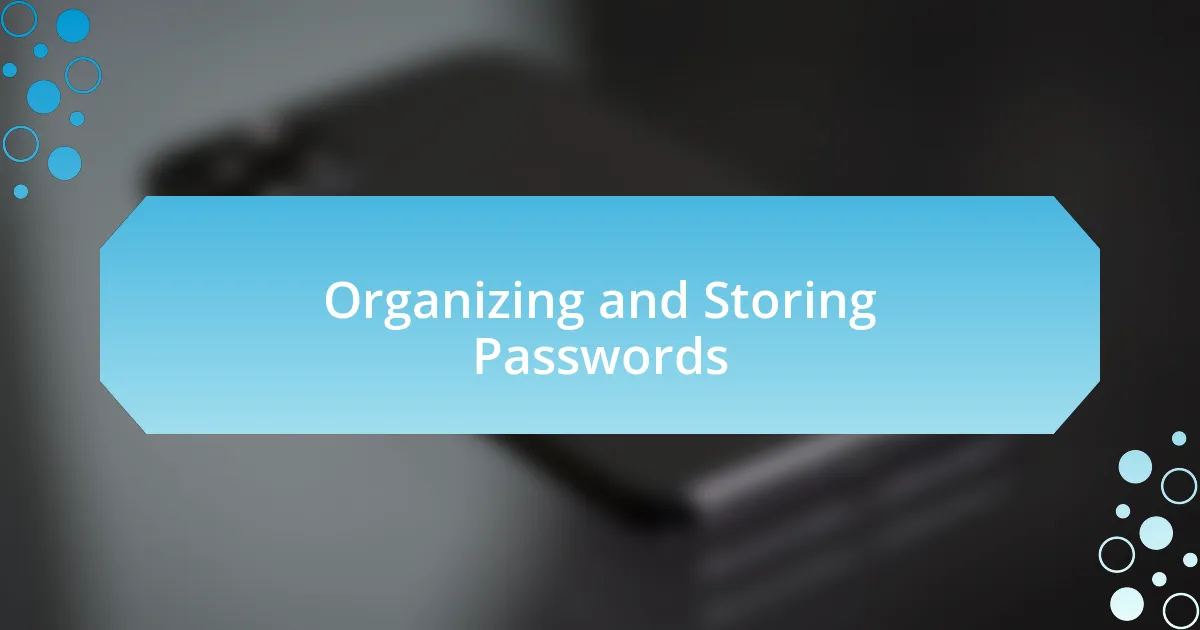
Organizing and Storing Passwords
Organizing passwords within my password manager has become something I genuinely look forward to. I remember when I first started, I stumbled across the folder feature and thought, “Why didn’t I do this sooner?” Creating categories for work, personal use, and subscriptions simplified everything and made it so much easier to find what I needed in a pinch. It’s comforting to have my digital life neatly organized at my fingertips.
Storing passwords securely is more than just a convenience; it feels like a safeguard against the chaos of forgotten credentials. I was once locked out of an important account because I couldn’t remember the password, which was both frustrating and time-consuming. Since adopting a password manager, I have learned to store not just passwords but also security questions and notes to ensure that I never find myself in that situation again. Isn’t it nice to have everything consolidated in one place?
One aspect I’ve come to appreciate is the ability to set password expiration dates and reminders. I recall a time when I let a few critical passwords linger for too long, which was a huge oversight. Now, the password manager nudges me to update them regularly, which feels like a small yet crucial safety net. It’s this kind of proactive feature that encourages me to stay diligent about password security, reinforcing the idea that prevention is better than reaction when it comes to protecting my digital identity.
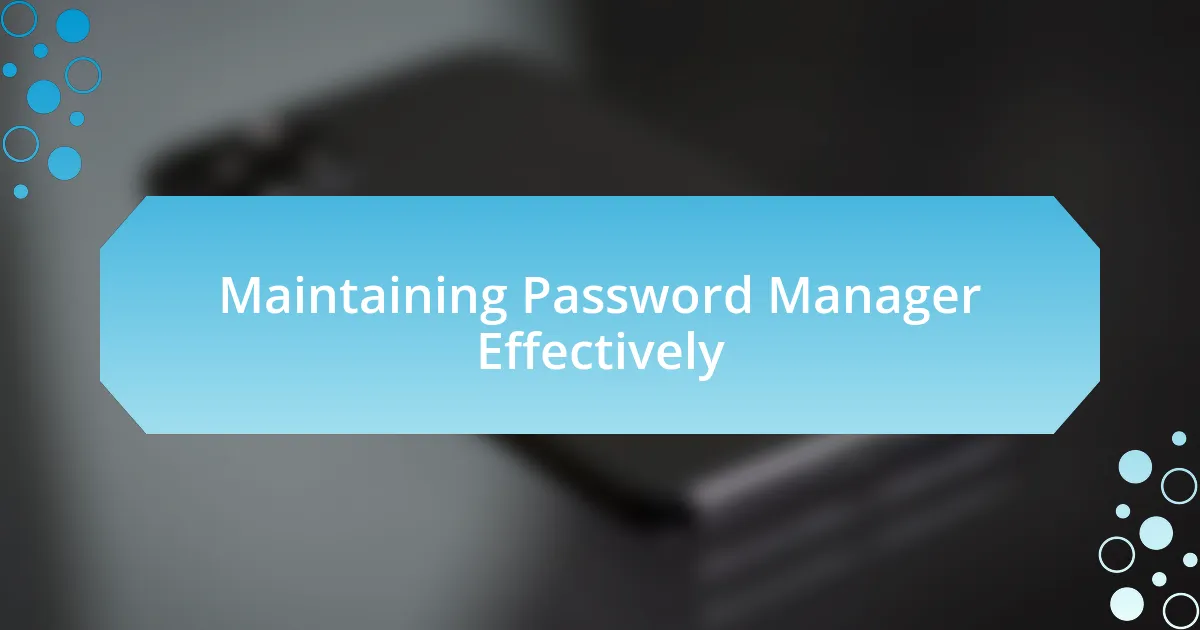
Maintaining Password Manager Effectively
When it comes to maintaining my password manager, periodic audits are essential. I remember the first time I decided to go through my saved passwords; it felt a bit like a digital spring cleaning. It’s surprising how many old accounts I had forgotten about, and wiping these out not only decluttered my manager but also boosted my confidence in my security practices. Have you ever felt that weight lift when you finally clear out what you no longer need?
Regular updates to my password manager itself are equally important. I often find myself setting aside a moment to check for new software updates, which can feel tedious but is truly worth it. Keeping the application up-to-date ensures that I benefit from the latest security enhancements and features. Just the other day, after I updated, I discovered a new auto-fill option that has made logging into sites faster than ever.
Additionally, I focus on creating strong and unique passwords for different accounts. I remember initially thinking that reusing a password across multiple sites would save time, but I’ve since learned that this is a risky move. I now use the password generator feature regularly, and I can’t emphasize enough how much peace of mind this brings. By giving each account its own distinct password, I’m taking a solid step toward safeguarding my online presence. Isn’t it empowering to feel in control of your digital life?
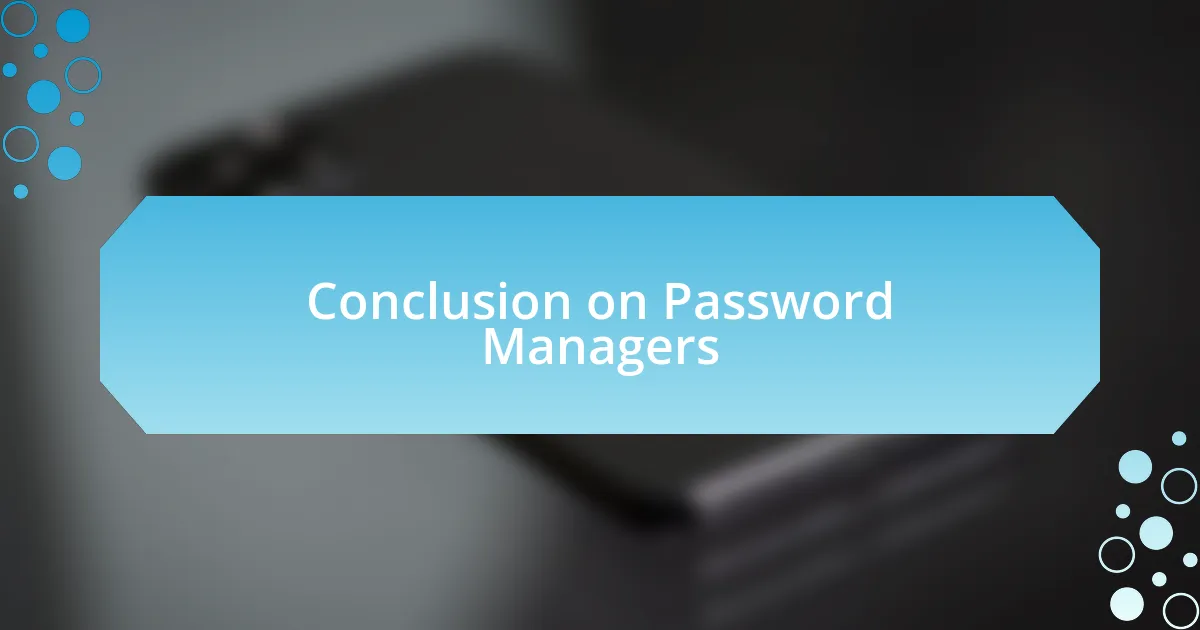
Conclusion on Password Managers
Using a password manager has profoundly changed my digital life for the better. I recall a time when I struggled to remember numerous passwords, often using the same one for multiple sites. Now, knowing that each password is unique and securely stored gives me a sense of liberation; I feel more confident exploring the internet without the nagging worry of forgotten logins.
There’s an incredible peace that comes from having a reliable vault for all my credentials. Once, I had a minor panic when I couldn’t recall the password to an important account. Fortunately, accessing my password manager was a breeze, and I retrieved it in seconds. Doesn’t that ease of access transform how we manage our online security?
Ultimately, my experience with password managers reflects not just on security but also on personal empowerment. They enable us to browse with less fear and more convenience. Can you imagine how much time we spend resetting passwords? With a password manager, those hassles are largely a thing of the past, allowing us to focus more on what truly matters in our digital interactions.











